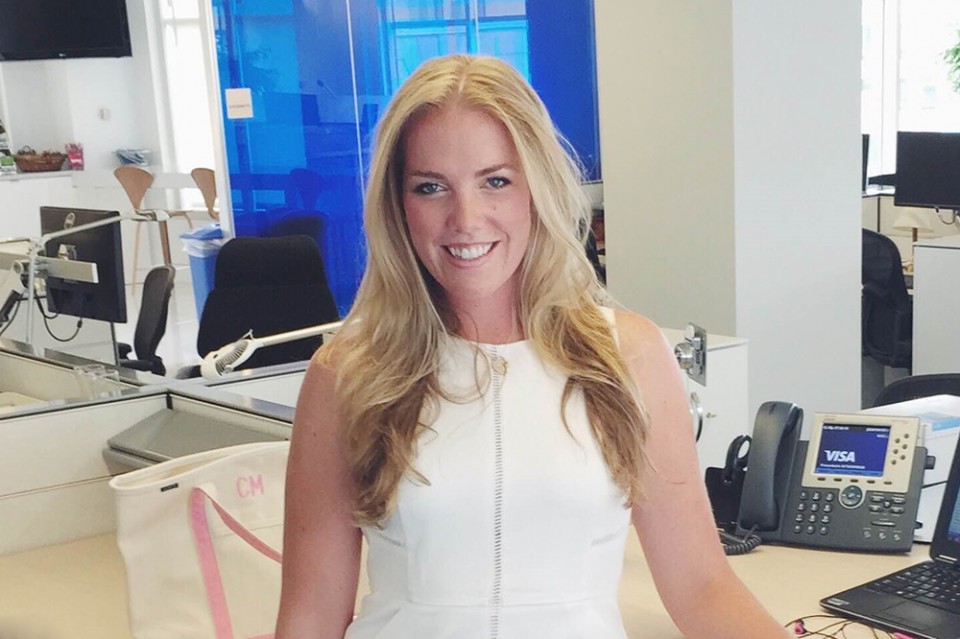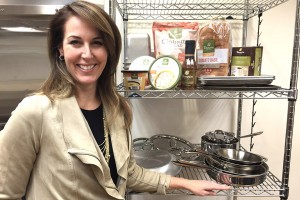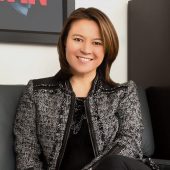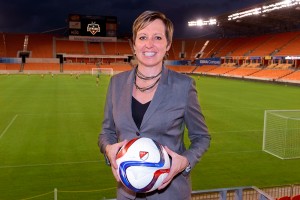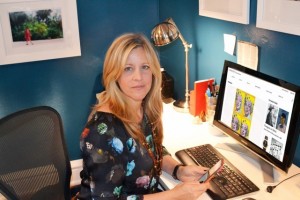Katie Mitchell, Global Government Relations Rep for Visa, World Traveler, and Energetic Idealist
Katie Mitchell, Washington, D.C. native, is an example of a millennial who is ready to take on the world – but she has already done that, to a certain extent. She spent part of her childhood in Seoul, South Korea, also spent time as a documentary filmmaker for the Clinton Global Initiative, and now works as a Senior Associate in Global Government Relations for the worldwide brand of Visa. She also does pro bono work for global nonprofits and social enterprises.
If any of these credentials bring to mind the picture of a serious bookworm/excessively studious type, that image is quickly dispelled with the news that she is also a huge sports buff, and rises very morning before 5 a.m. to take a bike ride along the Potomac river. She says that “seeing the monument’s catch the day’s first glow, and watching the whole city wake up, is undoubtedly the favorite part of my day.” She also enjoys trail-running, swimming and rowing.
At the office, Mitchell is a fan of women speaking up and “owning” their own success, along with collaborative modes of working. She also offers insights in her interview about leadership that seem to have emerged from the mind of someone decades older – along with excellent sample interview questions and the reasoning behind them.
Can you tell the readers a little bit about yourself?
I work as a policy strategist for Visa’s global government relations team in Washington, D.C. Essentially, we liaise between the business and key lawmakers throughout the world to promote policies that enable our business to grow.
What does a day in your shoes typically look like?
The only thing typical about my day is that there is no ‘typical day’ – but roughly it goes as follows:
I wake up around 4:15 a.m., and am out the door by 4:45, either to the boathouse where I’ll go for a ninety-minute row, or to the pool. I watch the sunrise over the lap lanes or Potomac while breaking a sweat — and find gratitude in these stolen morning hours, reminding myself that my earlier grogginess is always worth it!
At work: We are very meeting-heavy; sometimes those consist of breakfast roundtables with members of Congress and fellow-leaders in the tech community, or all-staff conversations where we tick through the latest emerging issues. In addition to interfacing with my colleagues in the business, I play an active role in building coalitions on certain issues between other government relations offices throughout our industry, which demands a lot of coordination, collaboration, and knowledge-sharing.
Depending on the congressional calendar, I will often monitor hearings or votes to then update our executives on movement around policies that directly impact our business, or at times meet with congressional staff to further a relationship or speak to a specific item. All of this external engagement happens on top of internal deliverables, of which we have a tremendous amount.
On evenings where we do not have dinners or receptions, I’ll bike home the same way I came, often heading for a trail run or yoga session to close out my day.
What are the first 3 things you do when you wake up in the morning and the last 3 things you do before you go to bed?
Morning: Drink a big glass of water, Have an espresso, Hop on my Bike
Evening: Pack my bag for the next day, Check to make sure all of my alarms and back up alarms are set, One last peep at my phone.
What is your breakfast of choice?
Definitely coffee with a side of oatmeal –it’s a great canvas to jazz up with anything from berries to homemade chia pudding!
What keeps you energized and motivated at work?
I’m energized by a challenge and motivated to make myself better every day.
What is your favorite part about your job?
I love the dynamism of my job – we double as firefighters at times because emergencies pop out of seemingly nowhere and our days are largely unpredictable.
How does your culture/background influence your work?
When I was in elementary/middle school I lived for a few years in Seoul, South Korea. The experience of living and traveling in Asia exposed me to various cultures, as well as economic and social disparities that have stuck with me ever since, and informed my inclination toward altruism.
How many times have you changed your career direction?
The nature of the rotational program is that I changed direction quite regularly at the onset of my career, spanning roles in financial institution sales, pricing strategy, innovation and strategic partnerships, and eventually government relations. I worked on four diverse teams on varying projects that provided a panoramic view of payments and business.
Three questions you like to ask during an interview to know if the candidate (or job) is the right fit?
-
-
- “Tell me about yourself.” – An open-ended question is a great way to see how an interviewee can navigate his thoughts in the absence of specific structure, while generating a succinct response that speaks to his background, but also ties into his candidacy for the job.
- “Talk about a time you’ve failed.” – Understanding failure and learning from that experience is crucial to professional success. I think that having comfort in discussing opportunities for learning and growth — and then the candidate articulating how they adjusted as needed — is extremely important.
- “How do you define success?” – How someone codifies success is really important in my mind. It might vary from industry to industry or function to function, but I’d look for an answer that aligns with the values of my office. That person is much more likely to work well the team and be professionally satisfied as well.
-
What are the most important qualities of a good leader?
-
-
- Self-Awareness – I’d claim that self-awareness is one of the most important qualities of any employee, but it’s especially crucial to leadership. I believe that being self-aware is the foundation to being an empathetic leader, and that understanding oneself is the first step to understanding one’s employees as well.
- Willingness to Delegate and Challenge – Great leaders delegate, even with the possibility of failure. They strategically place their employees into the deep end of the pool without a life-vest, understanding that’s the best way to learn to swim. The only road to professional as well as team growth is by challenging employees – something that managers do best when they are confident in themselves and how they are perceived by their own managers.
- Serve as a Buffer – Not every professional situation is ideal – but particularly in organizational turmoil or change, great leaders allow their employees to thrive in spite of the external environment. By contrast, sycophantic leaders might be more prone to expose their employees and their shortcomings to management so as to not “look bad.” In my mind, successful teams are the best indicator of a successful leader, and a mature leader recognizes that his/her success is best-defined by a thriving cohort of people reporting to him.
-
What is your favorite leisure activity after a stressful work week?
My colleagues often laugh at what constitutes as “leisure” for me – but certainly I love to enjoy the outdoors on the weekends, via biking, swimming, rowing, trail-running up mountains or yoga.
What has been your biggest obstacle in your career and how did you overcome it?
Probably admitting when I didn’t have the answer. Throughout my educational career, I was extremely successful, and therefore when I began working for Visa and assumed roles where I did not have a tremendous amount of experience or initial comfort, I had to learn how to “be a beginner” again.
What advantages do you see as a woman in the workplace?
I think women are truly the rock stars of the office. I have had so many amazing mentors and role models at my company, and every day I’m struck by the competence and unassumingly graceful leadership of my female colleagues.
What advice would you give women starting their careers?
Be bold and own your success.
What book would you recommend for women just starting their career?
The Defining Decade – this is a great, albeit somewhat alarming, read about life, work, and love in your 20s, what author Meg Jay claims is the prime decade for defining your ensuing life.
Favorite quote you try to live by: “Vocation is where your deepest gladness and the world’s deepest hunger meet.” — Frederick Buechner
TAGS: SharpSavvySignificant
 Interviewer Interview Prep
Interviewer Interview Prep Impactful Mentees
Impactful Mentees Benefits of a Mentor
Benefits of a Mentor Advice for First-Time Managers
Advice for First-Time Managers Overcoming the 18-month Itch
Overcoming the 18-month Itch Dressing for Your Style
Dressing for Your Style Interview Style Tips
Interview Style Tips Women's Stocking Stuffers
Women's Stocking Stuffers Gift the Busy Traveler
Gift the Busy Traveler Father’s Day Gift Guide
Father’s Day Gift Guide Airport Layover Activities
Airport Layover Activities Traveling & Eating Healthy
Traveling & Eating Healthy Travel Like a Boss Lady
Travel Like a Boss Lady The Dual California Life
The Dual California Life Gifts for Thanksgiving
Gifts for Thanksgiving Summer Reading List
Summer Reading List Top Leisurely Reads
Top Leisurely Reads New Year, New Books
New Year, New Books Life Lessons from a Sitcom
Life Lessons from a Sitcom Oprah, Amy or Amal?
Oprah, Amy or Amal?





